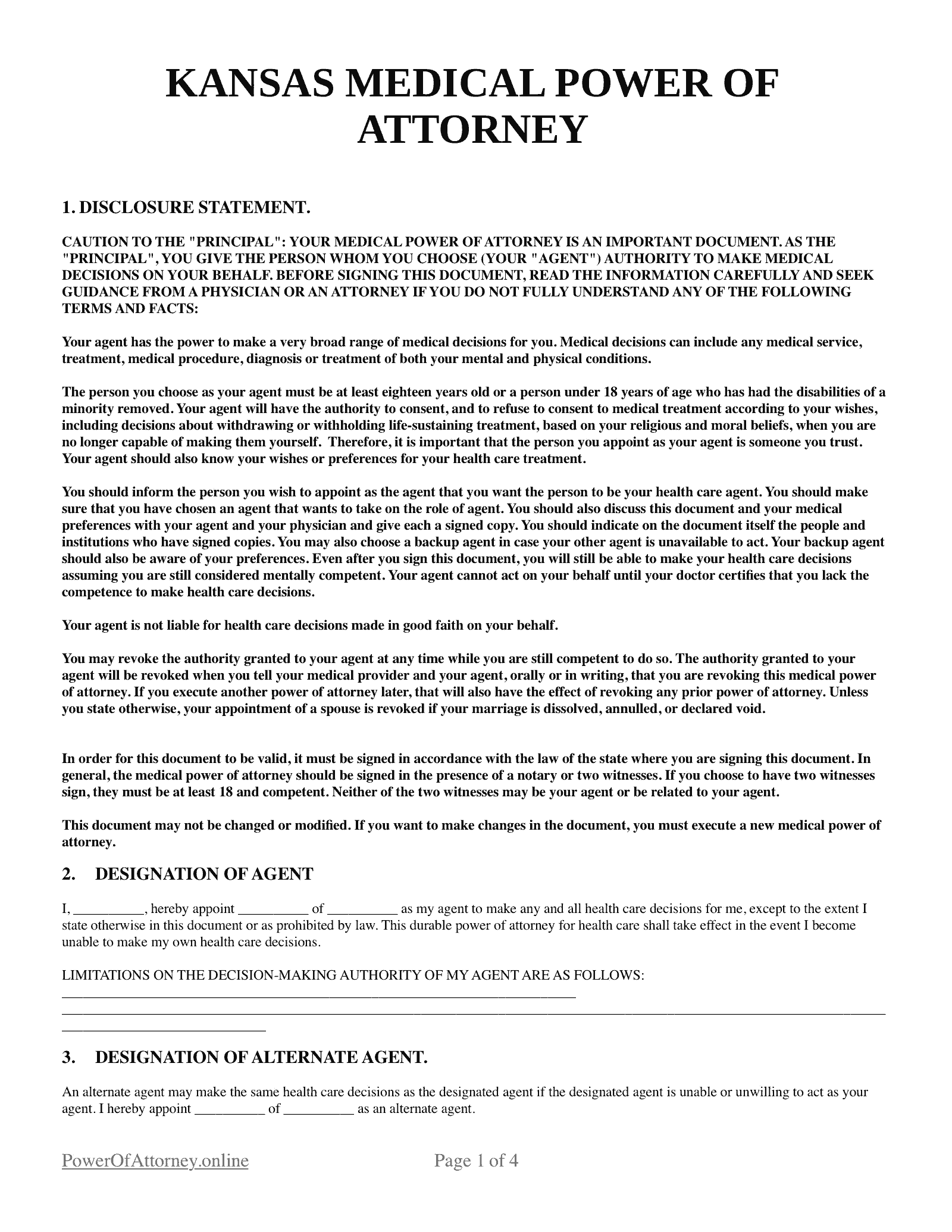Free Kansas Medical Power of Attorney Forms
A Medical Power of Attorney (MPOA) is a legal document that allows an individual (the “principal”) to designate another person (the “agent”) to make healthcare decisions on their behalf if they become incapacitated or unable to communicate their wishes.
This helps ensure that medical decisions** align with the principal's preferences,** even if they are unable to voice them.

Kansas Medical Power of Attorney Laws
Certain statutes in Kansas Law define what an MPOA is in Kansas and how the legal form can be used.
- Durable power of attorney for health care decisions: This statute declares by including “this power of attorney for health care decisions shall not be affected by subsequent disability or incapacity of the principal” on the POA, the agent will with the power to make medical decisions (§58-625).
Signing Requirements in Kansas
For your Medical Power of Attorney form to be considered legally valid, you will** need to meet the signing requirements** in Kansas.
- **Signing requirements: **The document must be signed in front of a notary public or 2 witnesses (§58-632).
The witnesses** must be of lawful age** and cannot be the agent or someone related to the principal.
How to Write a Medical POA in Kansas
To ensure your Kansas Medical Power of Attorney is put into effect and keeps your interests safe, it must clearly list all the required terms and personal information.
By going through the entire MPOA writing process, you can guarantee that your healthcare decisions are in trusted hands should you become incapacitated.
Below is a step-by-step guide to help you navigate the process in the state of Kansas.
1. Decide on an agent or agents
Your agent will be the person responsible for making medical decisions on your behalf. It's crucial to choose someone you trust. Your agent should understand and respect your medical preferences.
It’s also a good idea to select a secondary agent as a backup in case your primary agent is unavailable or unwilling to act when needed.
2. Talk to the possible Agent
Before finalizing your decision, have a candid conversation with the potential agent. Discuss your medical preferences, values, and any specific wishes you might have.
This step helps to confirm that the agent is comfortable with the responsibility and understands the gravity of the role.
3. Download a printable MPOA template
While you can draft an MPOA from scratch,** using a template can simplify the process**. With our printable template, you can customize your document to include your healthcare preferences and meet Kansas state requirements.
This will make it easier to get the form and** for much less money** than going to a lawyer.
4. Add the powers of the agent
Detail the specific powers and responsibilities you're granting to your agent. This can range from general medical decisions to more specific tasks like:
- Deciding on surgical procedures
- Accessing medical records
- Making end-of-life decisions
- Choosing or refusing specific treatments
Remember, the more clarity you provide, the easier it will be for your agent to act in your best interests.
5. Discuss compensation (if applicable)
Certain agents, especially close family or friends, might not expect compensation. However, it's essential to address this topic as many agents do receive some sort of payment. If you compensate your agent for their time and effort, specify the amount or rate in the document.
If not, clearly state that the agent will not receive any compensation beyond reimbursement for out-of-pocket expenses related to their duties.
6. Sign the MPOA in front of the required witnesses
As mentioned earlier, for your MPOA to be legally binding in Kansas:
- It must be signed by the principal
- It must either be notarized or witnessed by 2 adults
When choosing witnesses, keep in mind the restrictions. The witnesses cannot be the appointed agent, related to you (the principal), or have a claim against your estate.
Once signed and witnessed (or notarized), your MPOA is active.